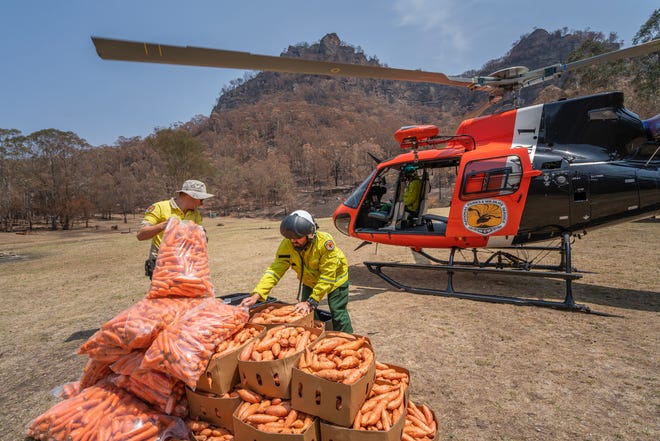The New South Wales National Parks and Wildlife Service in Australia provided a valuable assist to wallabies looking for a meal in the wake of devastating wildfires.
To help, the department made it rain carrots and sweet potatoes.
The National Parks and Wildlife Service dropped thousands of pounds of vegetables to assist the Brush-tailed Rock-wallaby population, whose food sources were limited after wildfires tore through their habitats, according to the department.
In a statement, the department said, "1000 kilograms of sweet potato and carrot have been sent to six different colonies in the Capertee and Wolgan valleys; 1000 kilograms across five sites in Yengo National Park; almost 100 kilograms of food and water in the Kangaroo Valley, with similar drops having also taken place in Jenolan, Oxley Wild Rivers and Curracubundi national parks."
That amounts to more than 4,600 pounds of food and water. The provisions were dropped from helicopters and delivered by land, a spokesperson from the National Parks and Wildlife Service told USA TODAY.
"The provision of supplementary food is one of the key strategies we are deploying to promote the survival and recovery of endangered species like the Brush-tailed Rock-wallaby," New South Wales Minister for Energy and Environment Matt Kean said in a statement.
Kean said the food drop was the most widespread ever done for the Brush-tailed Rock-wallabies. He added that cameras are being set up to monitor the food and animals in the region.
Falling tree:Firefighter dies as Australia plans to adapt to wildfires
The National Parks and Wildlife spokesperson said intensive feral predator control, which includes programs like fox control, will be implemented "to reduce further risk to the species."
"At this stage, we expect to continue providing supplementary food to rock-wallaby populations until sufficient natural food resources and water become available again in the landscape, during post-fire recovery," Kean said.

Animals in Australia have hit hard by the effects of scorching heat and brush fires.
The World Wildlife Fund in Australia estimates that as many as 1.25 billion animals may have been killed directly or indirectly from the fires that have burned in Australia since September.
Just last week, Aboriginal officials in South Australia approved the killing of more than 10,000 feral camels in a region battling drought.
